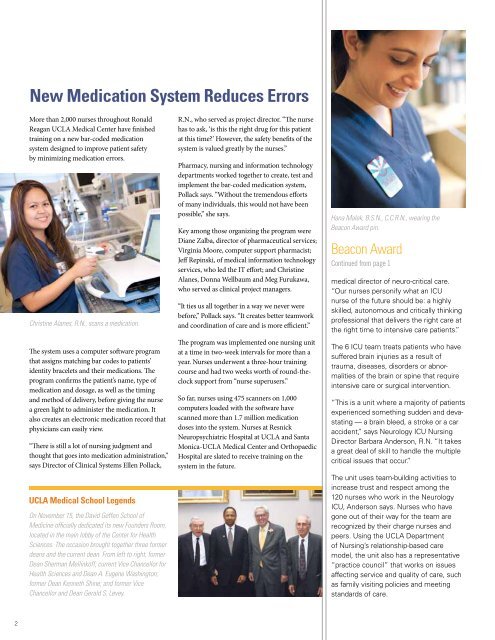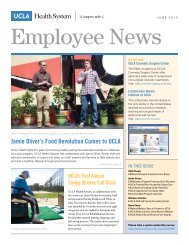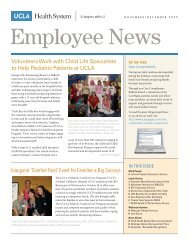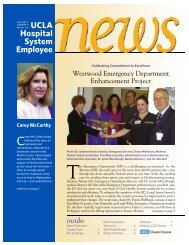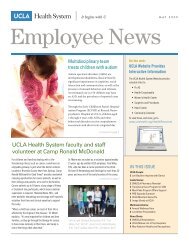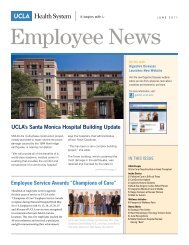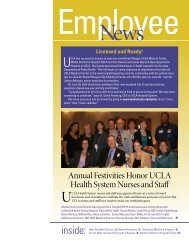ICU Receives Award for Excellence - UCLA Health System
ICU Receives Award for Excellence - UCLA Health System
ICU Receives Award for Excellence - UCLA Health System
You also want an ePaper? Increase the reach of your titles
YUMPU automatically turns print PDFs into web optimized ePapers that Google loves.
New Medication <strong>System</strong> Reduces Errors<br />
More than 2,000 nurses throughout Ronald<br />
Reagan <strong>UCLA</strong> Medical Center have finished<br />
training on a new bar-coded medication<br />
system designed to improve patient safety<br />
by minimizing medication errors.<br />
Christine Alanes, R.N., scans a medication.<br />
The system uses a computer software program<br />
that assigns matching bar codes to patients’<br />
identity bracelets and their medications. The<br />
program confirms the patient’s name, type of<br />
medication and dosage, as well as the timing<br />
and method of delivery, be<strong>for</strong>e giving the nurse<br />
a green light to administer the medication. It<br />
also creates an electronic medication record that<br />
physicians can easily view.<br />
“There is still a lot of nursing judgment and<br />
thought that goes into medication administration,”<br />
says Director of Clinical <strong>System</strong>s Ellen Pollack,<br />
<strong>UCLA</strong> Medical School Legends<br />
On November 15, the David Geffen School of<br />
Medicine officially dedicated its new Founders Room,<br />
located in the main lobby of the Center <strong>for</strong> <strong>Health</strong><br />
Sciences. The occasion brought together three <strong>for</strong>mer<br />
deans and the current dean. From left to right, <strong>for</strong>mer<br />
Dean Sherman Mellinkoff; current Vice Chancellor <strong>for</strong><br />
<strong>Health</strong> Sciences and Dean A. Eugene Washington;<br />
<strong>for</strong>mer Dean Kenneth Shine; and <strong>for</strong>mer Vice<br />
Chancellor and Dean Gerald S. Levey.<br />
R.N., who served as project director. “The nurse<br />
has to ask, ‘is this the right drug <strong>for</strong> this patient<br />
at this time?’ However, the safety benefits of the<br />
system is valued greatly by the nurses.”<br />
Pharmacy, nursing and in<strong>for</strong>mation technology<br />
departments worked together to create, test and<br />
implement the bar-coded medication system,<br />
Pollack says. “Without the tremendous ef<strong>for</strong>ts<br />
of many individuals, this would not have been<br />
possible,” she says.<br />
Key among those organizing the program were<br />
Diane Zalba, director of pharmaceutical services;<br />
Virginia Moore, computer support pharmacist;<br />
Jeff Repinski, of medical in<strong>for</strong>mation technology<br />
services, who led the IT ef<strong>for</strong>t; and Christine<br />
Alanes, Donna Wellbaum and Meg Furukawa,<br />
who served as clinical project managers.<br />
“It ties us all together in a way we never were<br />
be<strong>for</strong>e,” Pollack says. “It creates better teamwork<br />
and coordination of care and is more efficient.”<br />
The program was implemented one nursing unit<br />
at a time in two-week intervals <strong>for</strong> more than a<br />
year. Nurses underwent a three-hour training<br />
course and had two weeks worth of round-theclock<br />
support from “nurse superusers.”<br />
So far, nurses using 475 scanners on 1,000<br />
computers loaded with the software have<br />
scanned more than 1.7 million medication<br />
doses into the system. Nurses at Resnick<br />
Neuropsychiatric Hospital at <strong>UCLA</strong> and Santa<br />
Monica-<strong>UCLA</strong> Medical Center and Orthopaedic<br />
Hospital are slated to receive training on the<br />
system in the future.<br />
Hana Malek, B.S.N., C.C.R.N., wearing the<br />
Beacon <strong>Award</strong> pin.<br />
Beacon <strong>Award</strong><br />
Continued from page 1<br />
medical director of neuro-critical care.<br />
“Our nurses personify what an <strong>ICU</strong><br />
nurse of the future should be: a highly<br />
skilled, autonomous and critically thinking<br />
professional that delivers the right care at<br />
the right time to intensive care patients.”<br />
The 6 <strong>ICU</strong> team treats patients who have <br />
suffered brain injuries as a result of <br />
trauma, diseases, disorders or abnormalities<br />
of the brain or spine that require<br />
intensive care or surgical intervention.<br />
“This is a unit where a majority of patients<br />
experienced something sudden and devastating<br />
— a brain bleed, a stroke or a car<br />
accident,” says Neurology <strong>ICU</strong> Nursing<br />
Director Barbara Anderson, R.N. “It takes<br />
a great deal of skill to handle the multiple<br />
critical issues that occur.”<br />
The unit uses team-building activities to<br />
increase trust and respect among the<br />
120 nurses who work in the Neurology<br />
<strong>ICU</strong>, Anderson says. Nurses who have<br />
gone out of their way <strong>for</strong> the team are<br />
recognized by their charge nurses and<br />
peers. Using the <strong>UCLA</strong> Department<br />
of Nursing’s relationship-based care<br />
model, the unit also has a representative<br />
“practice council” that works on issues<br />
affecting service and quality of care, such<br />
as family visiting policies and meeting<br />
standards of care.<br />
2


